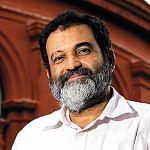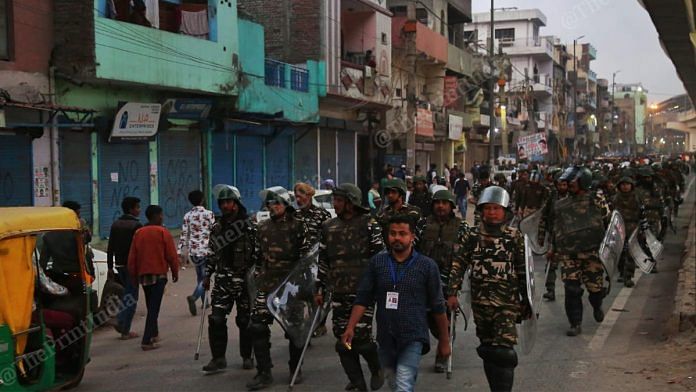 Cop out in Delhi
Cop out in Delhi
Prakash Singh | Chairman, Indian Police Foundation
The Indian Express
Singh describes the Delhi Police as “the best-resourced police in the country” which is “looked upon as a model by state police forces across the country” but argues that “it has not covered itself with glory while dealing with recent agitations”. He blames the police for not acting in an “objective and impartial manner” but also puts the blame on the politicians, “police response invariably reflects the bias of the ruling party”, he argues.
 Spectacle and the city
Spectacle and the city
Amrita Shah | Author of ‘Ahmedabad: A City in the World’
The Indian Express
Shah discusses the importance of the city of Ahmedabad, which has hosted multiple foreign leaders including US President Donald Trump. She traces the history of the city, including the fact that it was a major financial hub for the Mughals, and argues that “what we are witnessing is a new style of politics”. Thus, “Putting Ahmedabad before Delhi on Trump’s itinerary symbolises a reversing of priorities with money and entrepreneurship taking precedence over politics and conquest”.
 Trumping the naysayers
Trumping the naysayers
Sujan R. Chinoy | Former Ambassador of India and currently the director-general of the Manohar Parrikar Institute for Defence Studies and Analyses, New Delhi
The Indian Express
Chinoy describes US President Donald Trump’s “high voltage” visit to India, a major success. Referring to the various deals signed between Modi and Trump, including the defence deal, he argues “bilateral relations are set to deepen to mutual advantage” for both countries.
 With pacts on defence, oil and LNG, new chapter begins in India-US relations
With pacts on defence, oil and LNG, new chapter begins in India-US relations
Biswajit Dhar | Professor at Centre of Economic Studies, JNU
Mint
Dhar explains how with the new defence mega deal with the US, purchasing Apache and MH-60 Romeo helicopters valued at over $3 billion “opened a new chapter in… bilateral relations” between the two countries. He also praises the deals in oil and LNG, noting, “As the government takes the next steps to open its market to the business interests from the US, its ability to protect domestic interests while increasing its integration with its strategic partner, will be watched with interest”.

 Can the Budget reverse the slowdown?
Can the Budget reverse the slowdown?
C. Rangarajan | Former RBI Governor
D.K. Srivastava| Chief Policy Advisor, EY India
The Hindu Business Line
The authors argue that even though the Budget was “frank enough” to keep the annual growth in Centre’s gross tax revenues at 4 per cent, that actual tax revenues may be even lower. According to Rangarajan and Srivastava, the uncertainty regarding tax revenue, excess borrowing to meet revenue expenses and the central government’s limited commitment to the National Infrastructure Pipeline are not encouraging signs of reversing the slowdown.

 High depreciation rates accompanied by low tax rates give unnecessary advantage to big companies
High depreciation rates accompanied by low tax rates give unnecessary advantage to big companies
TV Mohandas Pai | Chairman, Aarin Capital Partners
S. Krishnan | Tax consultant
Pai and Krishnan argue that low tax rates benefit large companies whose effective tax ratio is anyway low. They argue, “Lowering this will enable the government to ensure equity between those who claim high depreciation and those who do not, as well as have a minimum revenue reduction.”
 The trade of between privacy and content traceability
The trade of between privacy and content traceability
Rahul Matthan | Partner, Trilegal
Mint
Matthan explains the urgent need for end-to-end encryption “to ensure that private conversations are secure from governments and private corporations alike.” However, he underscores that no discussion on encryption is complete if the manner in which it can be misused is not discussed. Matthan writes he is unsure if “we will ever be able to devise a system that strikes an appropriate balance between these two concerns.”
 Pushing the pedal on asset recycling
Pushing the pedal on asset recycling
Sudip Saral | Senior Director, CRISIL Infrastructure Advisory
Business Standard
Sural explains how asset recycling or monetisation “has emerged as a viable option for raising much-needed monies to fund India’s infrastructure build-out.” He also goes on to explain its benefits by stating that “operating infrastructure assets with stable cash flows for long tenures attract long-term investors such as pension and insurance funds. And for the economy and the public at large, more infrastructure is built, more jobs are created.”
Today’s Editorials
Hindustan Times: HT is highly critical of the Delhi Police and says it holds the maximum responsibility for the ongoing violence in the capital, aside from the Home Ministry, pro- and anti-CAA groups and political parties. The police have often been wrong while assessing a situation and there is a crisis of leadership within the Delhi Police, which might change after the appointment of S.N. Shrivastava.
The Hindu: Hindu, too, blames the Delhi Police and states that they have proved themselves woefully inadequate at best and outrageously partisan and communal at worst, in responding to the situation. The inaction and inefficiency of the police is also linked to the silent consent of the Home Ministry, it adds.
The Indian Express: Express notes that even though there were no dramatic agreements between Modi and Trump, the latter’s visit did have “substance”. The focus during the bilateral talks was on cooperation in a number of areas including defence, counter-terror cooperation, energy, trade, technology and regional security including the Indo-Pacific.
The Times of India: TOI, on the other hand, notes that not even a mini trade deal could be worked out between India and the US, and this shows how far apart the two sides are on this issue. India’s withdrawal from the RCEP makes it even more important to conclude a bilateral trade agreement to cement the bilateral relationship, it says.



